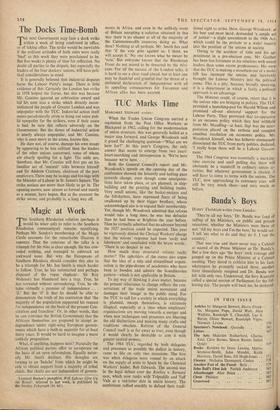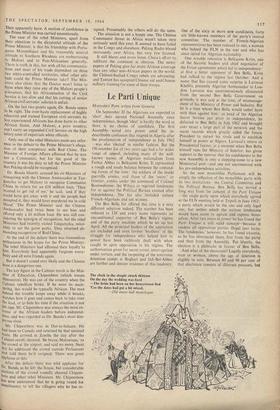Banda's Boys
HARRY FRANKLIN writes from Lusaka: 'They're all my boys,' Dr. Banda was fond of sating of his Ministers, on public and private occasions, whether the Ministers were there or not. 'All my boys and I'm the boss,' he would say.
'I tell 'em what to do and they do it. I run the country.', That was true and there never was a Cabinet as scared of its Prime Minister as Dr. Banda's, But a few days ago 'the boys' took courage and ganged up on the Prime Minister at a Cabinet meeting. They dared to criticise him to his face, whereupon he promptly sacked three, another three immediately resigned and Dr. Banda was left with only two. Undeterred, the fiery Kamuzu called a special session of Parliament for the fol- lowing day. The people will back me, he declared.
They apparently have. A motion of confidence in the Prime Minister was carried unanimously.
The case of the rebel Ministers, apart from their objection to the dictatorial attitude of the Prime Minister, is that his friendship with Portu- guese Mozambique and his reasonably neutral attitude to Southern Rhodesia are embarrassing to Malawi and to Pan-Africanism generally. 'There is truth in this, but with all his communica- tions and most of his trade dependent on these two white-controlled territories, what other atti- tude could the Prime Minister take? The Min- isters also claim that the Doctor won't listen to them when they raise any of the Malawi people's grievances, that his Africanisation of the Civil Service is too slow and that his cutting of senior African civil servants' salaries is unfair.
On the last two points again, Dr. Banda seems to be right. The over-hasty replacement of highly educated and trained European civil servants by less experienced Africans has done harm to other African States. And Malawi, a poor country,• can't carry an expanded Civil Service on the high salary rates of expatriate white officials.
Only one of the rebel Ministers made any refer- ence in the debateto the Prime Minister'S allega- tion of their conspiracy with. Red. China. The Minister of Foreign Affairs affirmed that he was not a Communist, but for the good of the country it was his duty to tell the Prime Minister that Peking should be recognised.
Dr. Banda bluntly accused his ex-Ministers of conspiring with the Chinese Ambassador in Tan- ganyika to get Malawi to recognise Communist China in return for an £18 million loan. 'They wanted to get rid of me,' he said, 'and if they could have got away with it and the people had accepted it, they would have murdered me in cold blood.' The Prime Minister said the Chinese Ambassador had twice been to see him and offered only a £6 million loan. He was still con- sidering the question of recognition, but the rebel Ministers had recently visited Tanganyika, osten- sibly to see the game parks. They returned de- manding recognition of Red China.
At the end of the debate there was tremendous enthusiasm in the house for the Prime Minister. The rebel Ministers had affirmed their loyalty to him. Everybody had apparently forgiven every- body and all were friends again.
But it doesn't sound very likely and the Chinese issue is a dangerous one.
The key figure in the Cabinet revolt is the Min- ister of Education, Chipembere (which means rhinoceros). He was out of the country when the Cabinet rebellion broke. If he were its main- spring, this would be typically African. The man behind the trouble keeps away while it breaks, Watches how it goes and comes back to take over the lead, or to bide his time if the situation is not Yet ripe. Mr. Chipembere was always the most ex- treme of the African leaders before independ- ence, and was regarded as Dr. Banda's most dan- gerous rival.
Mr. Chipembere was in Dar-es-Salaam. He had been to Canada and returned by that unusual route. He arrived in Zomba the day after the Cabinet revolt, shouted, 'Be brave, Malawians,' to the crowd at the airport, and said no more. Next day he addressed the crowd outside Parliament and told them he'd resigtied. There was great applause at this.
After the debate there was wild applause for Ur. Banda as he left the house, but considerable sections of the crowd roundly cheered Chipem- here and other rebel Ministers. Mr. Chipembere has now announced that he is going round his oonstituency to tell the villagers why he has re- -signed. Presumably the others will do the same.
The situation is not a happy one. The Chinese Communist threat in Africa wasn't taken very seriously until this year. It seemed to have failed in the Congo and elsewhere. Peking Radio blared incessantly over Africa. but very few listened.
It still blares and more listen. China's effort to infiltrate the continent is obvious. The news- papers of Peking give far. more African coverage than any other non-African papers in the world; the Chinese-backed Congo rebels are advancing;' and Tanzan has accepted Chinese aid andChinese military training for some of their troops.



































 Previous page
Previous page